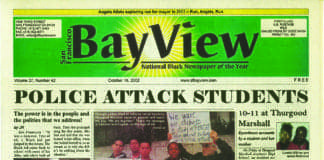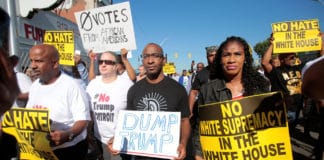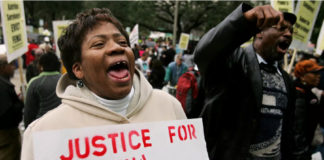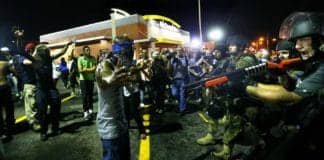Tags Bill Quigley
Tag: Bill Quigley
Bay View turns 40! Part 2
Now, as the San Francisco Bay View newspaper’s 40th birthday year comes to a close, is the time to bring up to date the historical sketch of our paper that I began with Part 1 in the January paper. Piles of old papers rest on my desk, waiting to be read once again – a banquet of stories and pictures of our lives, our hopes, our goals. Let me let you taste the flavor of the freedom we continue to fight for in the age of Trump.
Twelve ideas post-election from front line organizers
When you find yourself in a suddenly darkened room, what do you do? Some rush blindly to where they think the door might be. Others stand still, let their eyes adjust to the different environment, re-orient themselves, then, cautiously and sensitively, move forward. Some search out people who might be able to show the way. Post-election, a lot of people are re-assessing and searching for the best way forward. Here are some ideas from experienced, thoughtful people who are organizing on the front lines.
Katrina Pain Index 2016: Race and class gap widening
Hurricane Katrina hit 11 years ago. Population of the City of New Orleans is down by over 95,000 people. Almost all this loss of people is in the African American community. The gap between rich and poor in New Orleans is massive, the largest in the country. Despite receiving $76 billion in assistance after Katrina, it is clear that poor and working people in New Orleans, especially African Americans, got very little of that help. Here are the numbers.
No lawyers? No jail. Judge demands Constitution be respected in Louisiana...
New Orleans Criminal Court Judge Arthur Hunter, a former police officer, ruled that seven people awaiting trial in jail without adequate legal defense must be released. The law is clear. The U.S. Supreme Court, in their 1963 case Gideon v Wainwright, ruled that everyone who is accused of a crime has a Constitutional right to a lawyer at the state’s expense if they cannot afford one.
Public defender meltdown in Louisiana
Louisiana, which has the highest incarceration rate in the country, no longer provides public defenders to all its people accused of crimes; within months, over half its public defender offices are expected to become insolvent. “It’s a nightmare,” according to James Dixon, the chief Louisiana Public Defender. “You have people in jail that don’t have lawyers. It’s that basic.” The meltdown of the Louisiana public defender system makes it criminal to call it a justice system.
Plan Lanmó – the Death Plan: The Clintons, foreign aid and...
When Bill and Hillary Clinton married in 1975, a friend gave them a trip to Haiti for their honeymoon. The Washington Post reported: “Since that honeymoon vacation, the Caribbean island nation has held a life-long allure for the couple, a place they found at once desperate and enchanting, pulling at their emotions throughout his presidency and in her maiden year as secretary of state.”
New Orleans Katrina Pain Index at 10: Who was left behind?
When Hurricane Katrina hit the Gulf Coast on Aug. 29, 2005, the nation saw tens of thousands of people left behind in New Orleans. Ten years later, it looks like the same people in New Orleans have been left behind again. The population of New Orleans is noticeably smaller and noticeably whiter. While tens of billions poured into Louisiana, the impact on poor and working people in New Orleans has been minimal.
Fifteen most outrageous responses by police after killing unarmed people
Police kill a lot of unarmed people. So far in 2015, as many as 100 unarmed people have been killed by police. So far in 2015, there have been around 400 fatal police shootings; one in six of those killings, 16 percent, was of unarmed people, 49 had no weapon at all and 13 had toys, according to the Washington Post. Here are 15 of the most outrageous reasons given by police to justify killing unarmed people in the last 12 months.
Ten illegal police actions to watch for in Ferguson
When the Michael Brown verdict is announced, people can expect the police to take at least 10 different illegal actions to prevent people from exercising their constitutional rights. The Ferguson police have been on TV more than others, so people can see how awful they have been acting. But their illegal police tactics are unfortunately quite commonly used by other law enforcement in big protests across the U.S.
Sixty-five million left out of July 4 celebration
Over 65 million people in the U.S., perhaps a fifth of our sisters and brothers, are not enjoying the “unalienable rights” to “life, liberty and the pursuit of happiness” promised when the Declaration of Independence was adopted on July 4, 1776. They are about 20 percent of our U.S. population. This July 4 can be an opportunity to remember them and rededicate ourselves and our country to making these promises real for all people in the U.S.
Katrina Pain Index 2013: New Orleans eight years later
Eight years after Katrina, nearly a 100,000 people never got back to New Orleans, the city remains incredibly poor, jobs and income vary dramatically by race, rents are up, public transportation is down, traditional public housing is gone, life expectancy differs dramatically by race and place, and most public education has been converted into charter schools.
Slashed budget leaves hundreds of indigent defendants lawyerless in New Orleans
Draconian cuts in the budget for lawyers who represent indigent defendants have come back to haunt the Orleans Parish criminal justice system. Upwards of 500 indigent defendants may have been locked up without the benefit of an assigned defense attorney over the past year, according to a brief filed in the state Fourth Circuit Court of Appeal.
Katrina Pain Index 2012: Seven years after
There are 123,934 fewer people in New Orleans now than in 2000. How does New Orleans rank today, in comparison to other U.S. cities and the world, seven years after Katrina?
Haiti: Seven places where the earthquake money did and did not...
The U.N. estimated international donors gave Haiti over $1.6 billion in relief aid since the earthquake – about $155 per Haitian – and over $2 billion in recovery aid – about $173 per Haitian – over the last two years. Yet Haiti looks like the earthquake happened two months ago, not two years.
Report from Haiti: Where’s the money?
Broken and collapsed buildings remain in every neighborhood. Men pull oxcarts by hand through the street. Women carry 5-gallon plastic jugs of water on their heads, dipped from manhole covers in the street. Women carry 5-gallon plastic jugs of water on their heads, dipped from manhole covers in the street.
Katrina Pain Index 2011: Race, gender, poverty
Six years ago, Hurricane Katrina hit the Gulf coast. The impact of Katrina and government bungling continue to inflict major pain on the people left behind. It is impossible to understand what happened and what still remains without considering race, gender and poverty. The following offer some hints of what remains.
Six years after Katrina, the battle for New Orleans continues
As this weekend’s storm has reminded us, hurricanes can be a threat to U.S. cities on the East Coast as well the Gulf. But the vast changes that have taken place in New Orleans since Katrina have had little to do with weather and everything to do with political struggles.
Wave of illegal, senseless and violent evictions swells in Port au...
Mathias O is 34 years old. He is one of about 600,000 people still homeless from the January 2010 earthquake in Haiti. He lives with his wife and her 2-year-old under a homemade shelter made out of several tarps. They sleep on the rocky ground inside. The side tarp walls are reinforced by pieces of cardboard boxes taped together. Candles provide the only inside light at night. There is no running water. No electricity. They live near a canal and suffer from lots of mosquitoes.
MLK Injustice Index 2011: Racism, materialism and militarism in the U.S.
“We as a nation must undergo a radical revolution of values … when machines and computers, profit motives and property rights are considered more important than people, the giant triplets of racism, materialism and militarism are incapable of being conquered.” – Martin Luther King Jr., April 4, 1967
Million plus remain homeless and displaced in Haiti one year after...
One year after the Jan. 12, 2010, earthquake, more than a million people remain homeless in Haiti. People are living under plastic tarps or sheets in concrete parks, up to the edge of major streets, in the side streets, on the sides of hills, literally everywhere. One year later, it is critically important for the international community to assist Haitians to secure real housing. The million homeless Haitians are our sisters and brothers and still need our solidarity and help.











